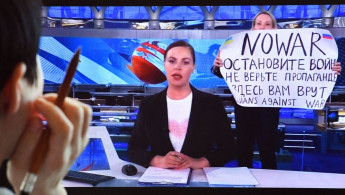Russian journalist who denounced Ukraine invasion released after short detention
Russian journalist Marina Ovsyannikova, who shot to prominence for interrupting a live TV broadcast to denounce Russia's military action in Ukraine, said Monday she had been released after a few hours in custody.
"I am at home. Everything is fine," she wrote on Facebook overnight. "Now I know it's better to leave home with my passport and my bag," she added.
Her lawyer, Dmitri Zakhvatov, said she was detained because she was suspected of having "discredited" the army in remarks outside a Moscow court last week in support of opposition activist Ilya Yashin, who is accused of spreading false information about the army.
After sending troops to Ukraine, Moscow adopted laws imposing sentences of up to 15 years for spreading information about the military deemed false by authorities.
So far, Russian authorities have not announced the opening of any criminal investigation against Ovsyannikova.
Her brief detention came several days after she demonstrated alone near the Kremlin, holding up a sign criticising the military intervention in Ukraine and President Vladimir Putin.
Ovsyannikova became known internationally in March after interrupting a live TV broadcast on the channel for which she worked to denounce Russia's military action in Ukraine.
She barged onto the set of at Channel One's flagship Vremya (Time) evening news programme, holding a poster reading "No War" in English.
Briefly detained, she was fined and subsequently released.
Marina Ovsyannikova has been detained in Moscow two days after picketing with a sign saying "Putin is a killer. His soldiers are fascists." There is also a case against her for "discrediting troops" for her Facebook posts. She famously picketed during a state TV broadcast. pic.twitter.com/azEMSbpXS0
— X Soviet 🇺🇦 (@XSovietNews) July 17, 2022
Images of her protest swept around the world, and she was applauded by people for her courage at a time when Russia is clamping down hard on dissenting voices.
The Russian opposition, however, did not universally welcome her protest. Some critics pointed out that she worked for years for another channel, Pervy Kanal, which they deemed a mouthpiece for the Kremlin.
In the months following her March protest, Ovsyannikova spent time abroad, including a brief period working for the German newspaper Die Welt.
In early July, she announced that she was returning to Russia to settle a dispute over the custody of her two children.





 Follow the Middle East's top stories in English at The New Arab on Google News
Follow the Middle East's top stories in English at The New Arab on Google News
![Israeli forces ordered bombed Gaza's Jabalia, ordering residents to leave [Getty]](/sites/default/files/styles/image_330x185/public/2176418030.jpeg?h=a5f2f23a&itok=_YGZaP1z)

